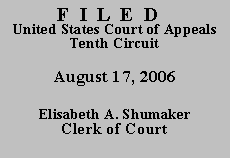

| UNITED STATES OF AMERICA,
Plaintiff-Appellee, Defendant-Appellant. |
No. 05-1454
(D.C. No. 93-CR-50-ZLW) (Colorado) |
On July 12, 2004, Mr. Custard filed his "Motion For Reduction of Sentence Pursuant To 18 U.S.C [§] 3582," in which he argued the United States Supreme Court's holding in Blakely v. Washington, 542 U.S. 296 (2004), required a review of his sentence. The district court determined it was without authority to consider Mr. Custard's request under § 3582, but then construed the filing as a § 2255 motion and dismissed it as time barred. Mr. Custard filed a "Motion for Recission [sic] Of the July 28, 2005 Order And/Or Notice of Appeal Of the July 28, 2005 Order," arguing the district court could not recharacterize his § 3582 motion as a § 2255 motion without first providing him notice of the "adverse consequences" of such a recharacterization and permitting him the opportunity to withdraw or amend his action. The district court denied his request to rescind the order. Before us, Mr. Custard renews his objection to the district court's recharacterization of his action.
The district court correctly concluded it could not modify Mr. Custard's sentence pursuant to § 3582 as he requested. "A district court is authorized to modify a Defendant's sentence only in specified instances where Congress has expressly granted the court jurisdiction to do so." United States v. Blackwell, 81 F.3d 945, 947 (10th Cir. 1996) (citations omitted). "Section 3582(c) provides that a court may not modify a term of imprisonment once it has been imposed except in three limited circumstances." United States v. Smartt, 129 F.3d 539, 540-41 (10th Cir. 1997) (emphasis in the original; citations and internal quotation marks omitted). None of those circumstances is present here. Accordingly, the district court was without jurisdiction to consider Mr. Custard's request for a modification of his sentence. See id. at 541.
The district court erred, however, in recharacterizing Mr. Custard's filing as a § 2255 motion without first notifying him of the consequences and providing him an opportunity to withdraw or amend his claims. In Castro v. United States, the United States Supreme Court held that a
district court must notify [a] pro se litigant that it intends to recharacterize [his] pleading, warn the litigant that this recharacterization means any subsequent § 2255 motion will be subject to restrictions on 'second or successive' motions, and provide the litigant an opportunity to withdraw the motion or to amend it so that it contains all the § 2255 claims he believes he has.
540 U.S. 375, 383 (2003). Because the district court failed to comply with the Supreme Court's holding in Castro, we conclude its recharacterization of Mr. Custard's filing was improper. The district court erred by denying Mr. Custard an opportunity to amend or withdraw his action.
Accordingly, we VACATE the court's recharacterization of Mr. Custard's action as a § 2255 motion, but we AFFIRM its dismissal of Mr. Custard's § 3582 action.
Entered for the Court
Stephanie K. Seymour
Circuit Judge
*.After examining appellant's brief and the appellate record, this panel has determined unanimously that oral argument would not materially assist the determination of this appeal. See Fed. R. App. P. 34(a)(2) and 10th Cir. R. 34.1(G). The case is therefore submitted without oral argument. This order and judgment is not binding precedent, except under the doctrines of law of the case, res judicata, or collateral estoppel. The court generally disfavors the citation of orders and judgments; nevertheless, an order and judgment may be cited under the terms and conditions of 10th Cir. R. 36.3.
1. Because he is proceeding pro se, we review Mr. Custard's pleadings and filings liberally. See Haines v. Kerner, 404 U.S. 519, 520-21 (1972); Hall v. Bellmon, 935 F.2d 1106, 1110 (10th Cir. 1991).